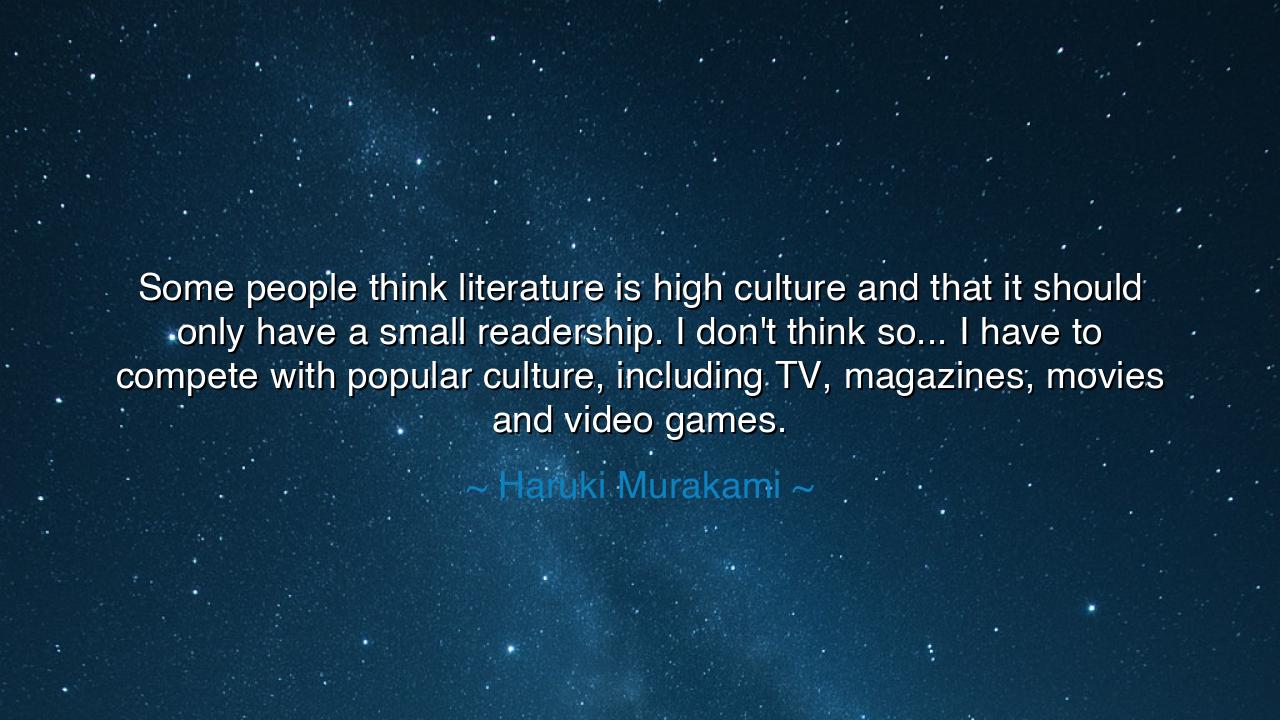
Some people think literature is high culture and that it should
Some people think literature is high culture and that it should only have a small readership. I don't think so... I have to compete with popular culture, including TV, magazines, movies and video games.






When Haruki Murakami said, “Some people think literature is high culture and that it should only have a small readership. I don’t think so... I have to compete with popular culture, including TV, magazines, movies and video games,” he struck at the heart of a debate as old as the written word itself. His words are not merely about books, but about the purpose of literature, about whether art exists only for the few who exalt it, or whether it is meant to flow through the lives of many, like water through the fields.
The origin of this thought lies in the history of storytelling. In ancient times, the bard did not recite his epic to a cloistered elite, but to the whole village, beneath the open sky, before the gathered crowd. Homer’s Iliad and Odyssey were not hidden treasures for scholars—they were sung aloud to warriors, farmers, children, and elders alike. Literature began not as a pedestal for the chosen few, but as a common fire where all might warm themselves. Murakami, in his words, calls us back to this truth: that literature, if it is to remain alive, must speak not only to scholars but to the beating hearts of ordinary people.
Yet the world has changed. In Murakami’s age—and ours—the writer must compete with the bright spectacles of television, the fast voices of magazines, the glamour of movies, and the endless thrill of video games. These forms of popular culture captivate the senses, offering immediate pleasure, while literature demands a slower gaze, a deeper listening. And yet, Murakami insists that the writer must not turn away in disdain. He does not scorn the crowd’s delights but steps boldly into the arena, declaring that literature must wrestle alongside them, must earn its place, must remind people that the written word, too, can enthrall.
Consider the story of Charles Dickens, who in the 19th century refused to write for scholars alone. He published his novels in newspapers and magazines, one chapter at a time, reaching not only the wealthy but also the working class who could afford only a few pennies. Crowds waited at the docks in New York for the ships that carried the latest installment of his tales. Dickens, like Murakami, believed that literature should not be a relic of ivory towers, but a living force in the streets. His words endured precisely because they were shared so widely.
The meaning of Murakami’s words is this: literature must not fear popular culture but embrace the challenge of it. It must reach beyond the rarefied halls of academia and find its voice among the multitude. For if literature is life, then it must live where life happens—in the bustle of cities, in the glow of screens, in the restless hearts of the young. The writer’s task is not only to preserve the sacred but to weave it into the fabric of the everyday.
The lesson for us is twofold. First, do not treat literature as a thing too holy to touch, too lofty to approach. Read it, cherish it, and let it move you, whether you are a scholar or a common laborer. Second, when you create—whether in words, music, or art—do not fear to meet the world where it already is. Do not withdraw into isolation, but offer your work in the marketplace of culture, where it may inspire those who might never have sought it.
What then should you do? Read boldly. Share stories. Support those who bring literature into the public sphere. And if you are a creator, remember Murakami’s courage: compete with the world not in bitterness but with passion. Write words that shine even amidst the clamor of screens, words that remind people that the human soul still hungers for depth.
Thus, let Murakami’s teaching be remembered: literature is not a jewel to be locked away in a tower, but a fire to be shared among the people. Compete with the noise of culture, yes—but do so with the confidence that the written word, if offered with truth and beauty, will always find its way into the hearts of those who listen.






AAdministratorAdministrator
Welcome, honored guests. Please leave a comment, we will respond soon